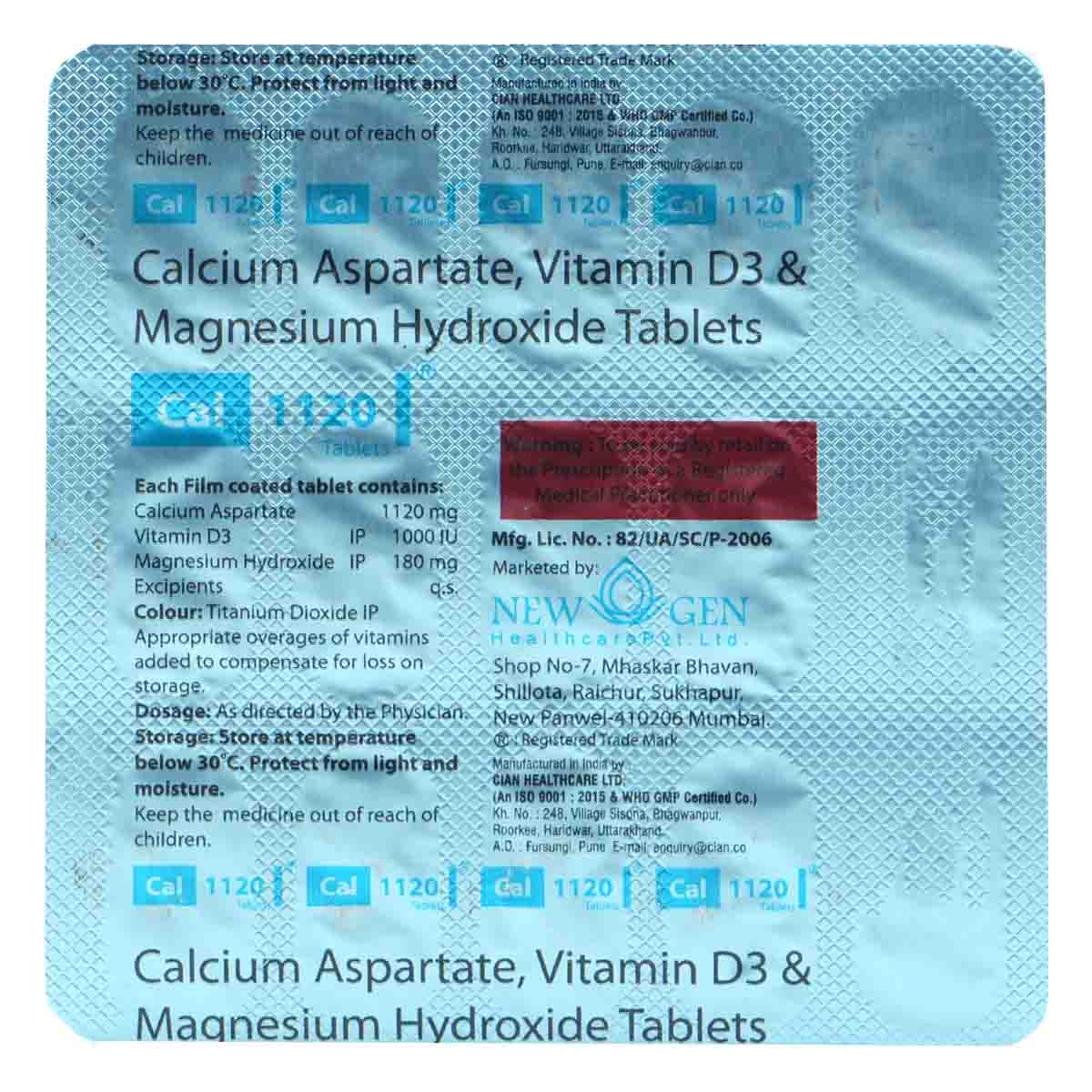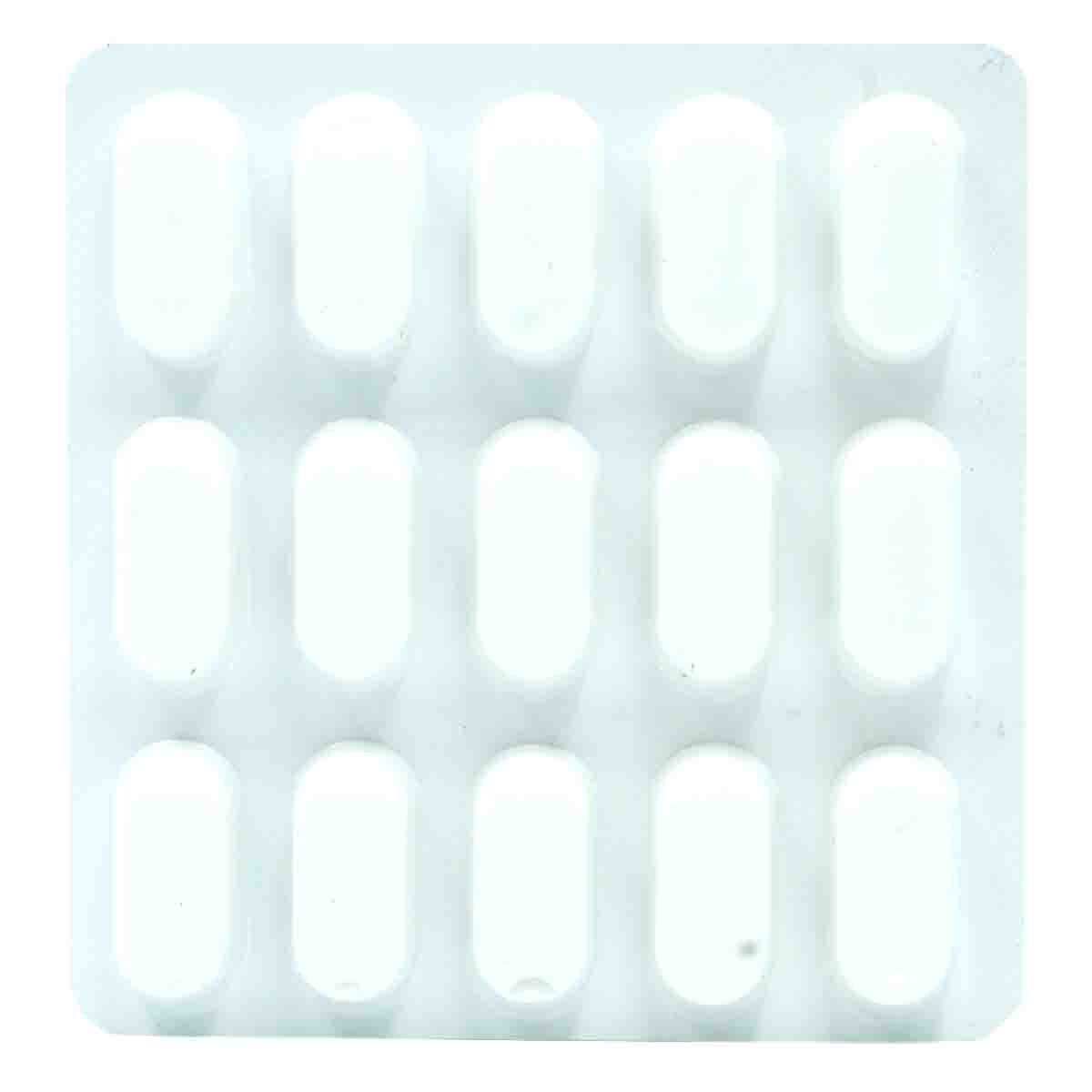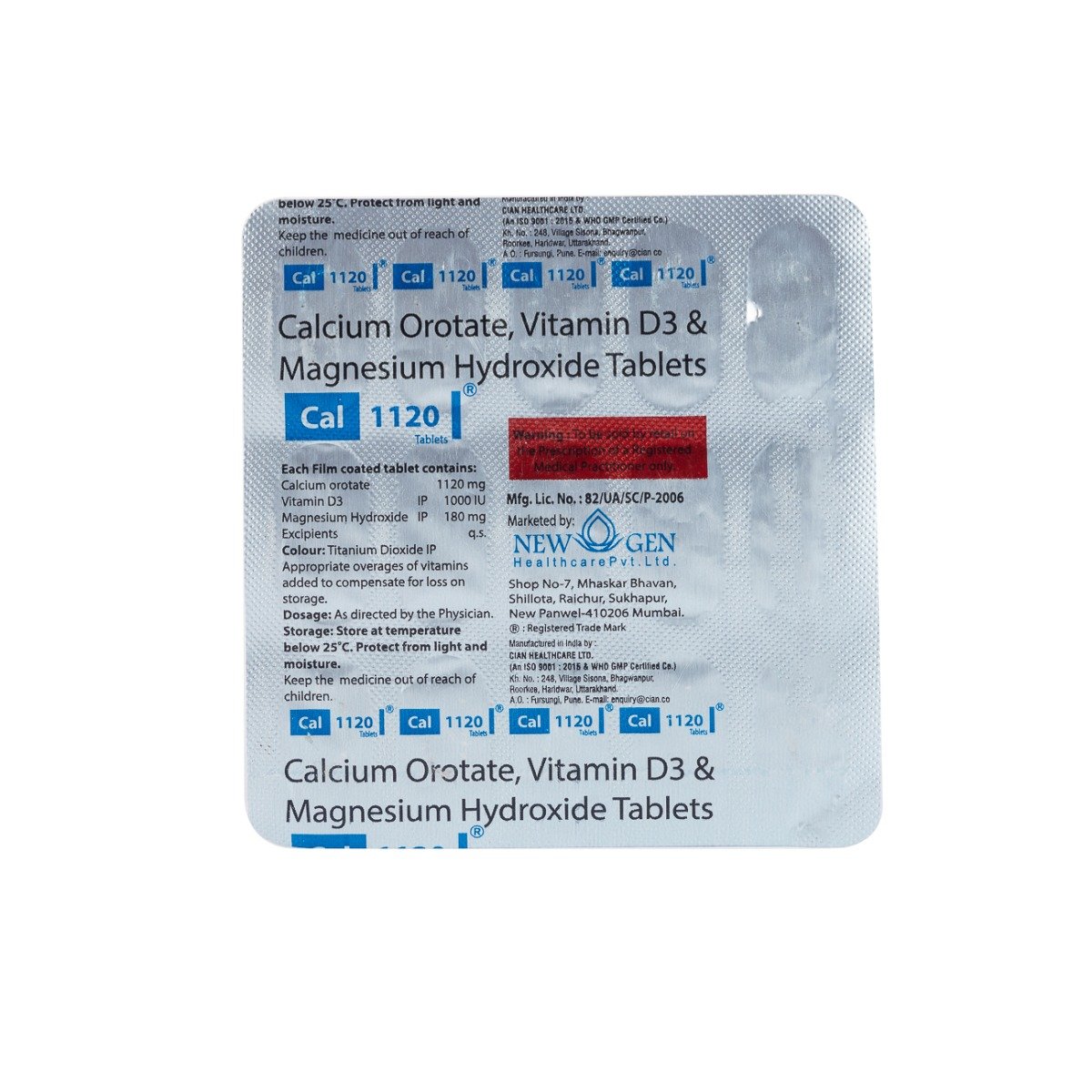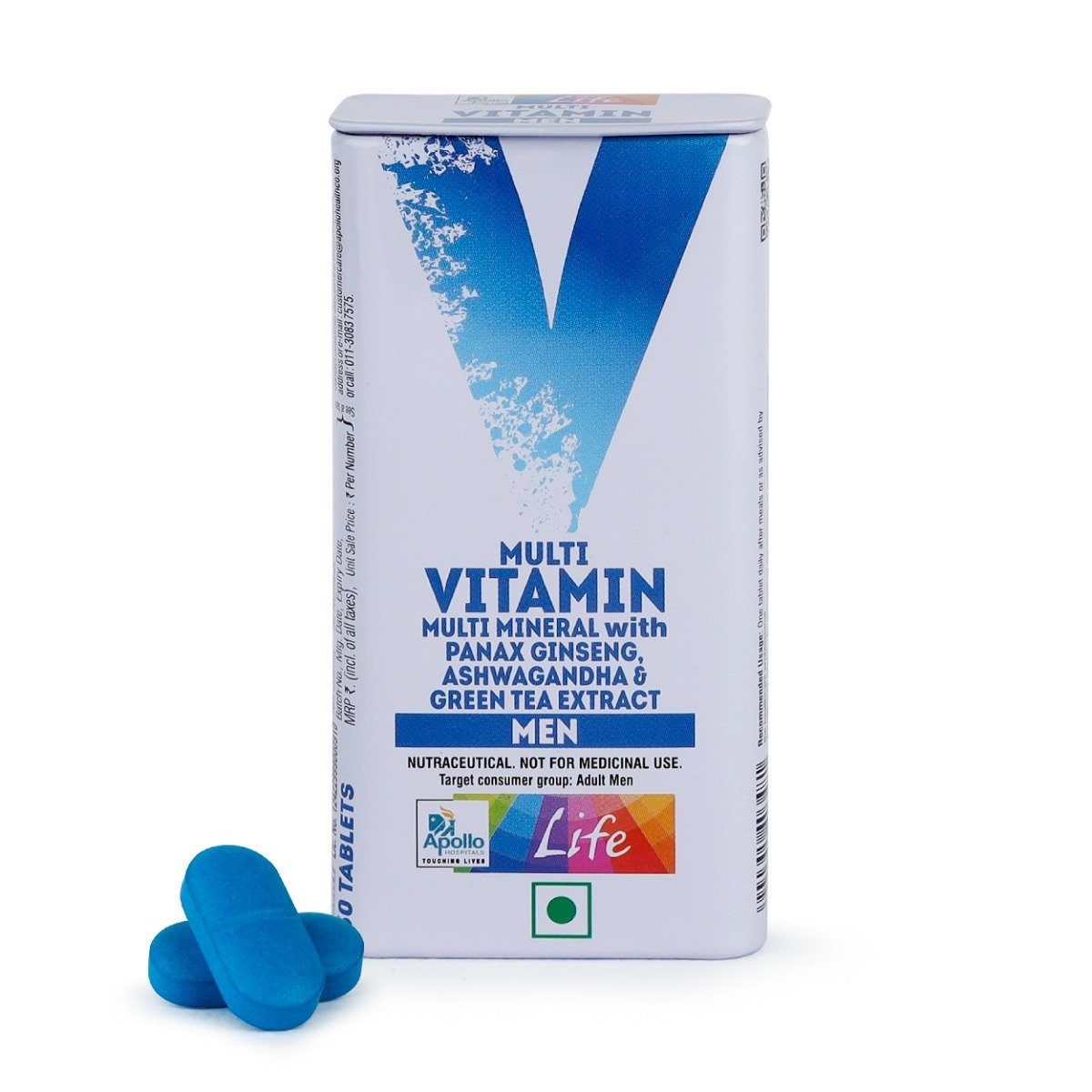Cal 1120 Tablet 15's
Selected Pack Size:15
15 ₹180
(₹12.0 per unit)
In Stock
10 ₹126
(₹12.6 per unit)
Out of stock
MRP ₹200
(Inclusive of all Taxes)
₹30.0 Cashback (15%)
Provide Delivery Location

secured payment

india's most trusted pharmacy

genuine products
Manufacturer/Marketer :
Consume Type :
Expires on or after :
Return Policy :
About Cal 1120 Tablet
Cal 1120 Tablet belongs to the class of 'nutritional supplements', primarily used to treat various conditions caused by low blood calcium levels (hypocalcemia) in the body like osteoporosis (weak and brittle bones) and osteomalacia (softening or deforming of bones due to lack of calcium). It also prevents muscle cramps and bone loss.
Cal 1120 Tablet consists of Calcium aspartate, Magnesium hydroxide, and Vitamin D3. Calcium aspartate prevents or treats a calcium deficiency. It provides essential nutrients necessary for bone formation and maintenance. Magnesium increases bone mineral density and aids in the normal functioning of muscles and nerves. Vitamin D3 helps maintain blood calcium and phosphorus levels and mineralization of bone.
Your doctor will decide the dosage and duration based on your medical condition. Cal 1120 Tablet is likely safe to use. In some cases, it may cause common side effects like diarrhoea, bloating, nausea, and vomiting. These side effects do not require medical attention and gradually resolve over time. However, if the side effects persist or worsen, consult a doctor.
If you are allergic to any of the components of Cal 1120 Tablet , please inform your doctor. Please tell your doctor if you have hypercalcaemia (high calcium levels), hypervitaminosis D (high vitamin D levels), heart/kidney/liver/blood vessel diseases, and kidney stones before starting Cal 1120 Tablet . Pregnant or breastfeeding women should consult their doctor before taking Cal 1120 Tablet . Cal 1120 Tablet should be used in children only when advised by the doctor. It is advised to avoid or limit alcohol consumption since it may affect calcium absorption.
Uses of Cal 1120 Tablet

Have a query?
Directions for Use
Key Benefits
Cal 1120 Tablet is used to treat low blood calcium levels. It consists of Calcium aspartate, Magnesium hydroxide, and Vitamin D3. Calcium aspartate is used to prevent or treat a calcium deficiency. It provides essential nutrients necessary for bone formation and maintenance. Magnesium hydroxide increases bone mineral density and maintains joint and bone health. Vitamin D3 helps maintain blood calcium and phosphorus levels and mineralization of bone. It aids in calcium absorption enabling bone growth and repair. It further prevents cartilage degeneration.
Storage
Drug Warnings
Let your doctor know if you are allergic to any of the components of Cal 1120 Tablet . Cal 1120 Tablet is not recommended if you have hypercalcaemia (high calcium levels) and hypervitaminosis D (high vitamin D levels). Brief your medical history to the doctor if you have any heart/kidney/liver/blood vessel diseases, kidney stones, achlorhydria (little or no stomach acid), low levels of bile, and phosphate imbalance before starting Cal 1120 Tablet . Please consult your doctor before taking Cal 1120 Tablet if you are pregnant or breastfeeding. Drinking alcohol can affect calcium absorption; therefore, it is advised to limit the alcohol intake while using Cal 1120 Tablet . Cal 1120 Tablet should be used in children only when recommended by the doctor.
Drug-Drug Interactions
Drug-Drug Interactions
Login/Sign Up
Cholecalciferol and doxercalciferol are forms of vitamin D, and taking too much vitamin D may lead to toxic effects.
How to manage the interaction:
Although there is a possible interaction between Cal 1120 Tablet and doxercalciferol, you can take these medicines together if prescribed by your doctor. If you notice any of these symptoms - irregular heartbeat, seizures, weakness, tiredness, headache, dizziness, ringing in the ears, loss of appetite, feeling sick, dry mouth, strange taste in your mouth, muscle or bone pain, thirst, losing weight, eye infection, sensitivity to light, runny nose or itching - make sure to call a doctor right away. Do not discontinue any medications without consulting a doctor.
The combined use of calcifediol with cholecalciferol can increase the risk of side effects.
How to manage the interaction:
Although there is a possible interaction between Cal 1120 Tablet and calcifediol, you can take these medicines together if prescribed by your doctor. If you notice any of these symptoms - irregular heartbeat, seizures, weakness, tiredness, headache, dizziness, ringing in the ears, loss of appetite, feeling sick, dry mouth, strange taste in your mouth, muscle or bone pain, thirst, losing weight, eye infection, sensitivity to light, runny nose or itching - contact a doctor right away. Do not discontinue any medications without consulting a doctor.
The combined use of cholecalciferol and paricalcitol are forms of vitamin D, and taking too much vitamin D may lead to toxic effects.
How to manage the interaction:
Although there is a possible interaction between Cal 1120 Tablet and paricalcitol, you can take these medicines together if prescribed by your doctor. If you notice any of these symptoms - irregular heartbeat, seizures, weakness, tiredness, headache, dizziness, ringing in the ears, loss of appetite, feeling sick, dry mouth, strange taste in your mouth, muscle or bone pain, thirst, losing weight, eye infection, sensitivity to light, runny nose or itching - contact a doctor right away. Do not discontinue any medications without consulting a doctor.
The combined use of cholecalciferol and ergocalciferol are forms of vitamin D, and taking too much vitamin D may lead to toxic effects.
How to manage the interaction:
Although there is a possible interaction between Cal 1120 Tablet and ergocalciferol, you can take these medicines together if prescribed by your doctor. If you notice any of these symptoms - irregular heartbeat, seizures, weakness, tiredness, headache, dizziness, ringing in the ears, loss of appetite, feeling sick, dry mouth, strange taste in your mouth, muscle or bone pain, thirst, losing weight, eye infection, sensitivity to light, runny nose or itching - contact a doctor right away. Do not discontinue any medications without consulting a doctor.
Co-administration of Cholecalciferol and Calcitriol are forms of vitamin D, and taking too much vitamin D may lead to toxic effects.
How to manage the interaction:
Although there is a possible interaction between Cal 1120 Tablet and calcitriol, you can take these medicines together if prescribed by your doctor. If you notice any of these symptoms - irregular heartbeat, seizures, weakness, tiredness, headache, dizziness, ringing in the ears, loss of appetite, feeling sick, dry mouth, strange taste in your mouth, muscle or bone pain, thirst, losing weight, eye infection, sensitivity to light, runny nose or itching - contact a doctor right away. Do not discontinue any medications without consulting a doctor.
The combined use of aluminum hydroxide with Cal 1120 Tablet may increase the risk of toxicity.
How to manage the interaction:
Co-administration of Cal 1120 Tablet with Aluminium hydroxide can possibly result in an interaction, but it can be taken if your doctor has advised it. If you're having any of these symptoms like bone pain, muscle weakness, anemia, seizures, or dementia, it's important to contact your doctor right away. Do not stop using any medications without a doctor's advice.
Taking Cholecalciferol together with Sucralfate may increase the risk or severity of kidney problems.
How to manage the interaction:
There may be a possibility of interaction between Cholecalciferol and Sucralfate, but it can be taken if prescribed by a doctor. Do not discontinue any medications without consulting a doctor.
Cholecalciferol and dihydrotachysterol are forms of vitamin D, and taking too much vitamin D may lead to toxic effects.
How to manage the interaction:
Although there is a possible interaction between Cal 1120 Tablet and dihydrotachysterol, you can take these medicines together if prescribed by your doctor. If you notice any of these symptoms - irregular heartbeat, seizures, weakness, tiredness, headache, dizziness, ringing in the ears, loss of appetite, feeling sick, dry mouth, strange taste in your mouth, muscle or bone pain, thirst, losing weight, eye infection, sensitivity to light, runny nose or itching - contact a doctor right away. Do not discontinue any medications without consulting a doctor.
Taking gefitinib with Cal 1120 Tablet can reduce the effectiveness of gefitinib
How to manage the interaction:
Although taking Dolutegravir and Gefitinib together can possibly result in an interaction, they can be taken together if prescribed by your doctor. In case you experience any unusual side effects, consult a doctor. Do not discontinue using any medications without consulting a doctor.
Taking Cal 1120 Tablet with Raltegravir may make the raltegravir less effective.
How to manage the interaction:
Taking Cal 1120 Tablet with Raltegravir together can possibly result in an interaction, but it can be taken if your doctor has advised it. However, consult your doctor if you experience any unusual symtopms. Do not stop using any medications without a doctor's advice.
Drug-Food Interactions
Drug-Food Interactions
Login/Sign Up
Diet & Lifestyle Advise
- Include dairy products like milk, yoghurt, cheese or milk-based custard in your diet.
- Eat daily a serving of broccoli, cabbage, bok choy, spinach and other green leafy vegetables.
- Include the best dietary sources of vitamin D, such as fish liver oils and vitamin D–fortified milk.
- Snack on calcium-rich nuts like Brazil nuts or almonds.
- Sprinkle sesame seeds over your food, vegetables and salads. Sesame seeds are rich in calcium.
- Avoid or reduce the intake of caffeine, soft drinks and alcohol as they may inhibit calcium absorption.
- Replace the meat with tofu or tempeh for extra calcium in your food.
Habit Forming
Therapeutic Class
All Substitutes & Brand Comparisons
RX
Out of StockCal 1120 Tablet 10's
Newgen Health Care Pvt Ltd
₹140
(₹12.6 per unit)
4% COSTLIER
Alcohol
Safe if prescribed
Drinking alcohol can affect calcium absorption; hence it is advised to limit/avoid the alcohol intake while using Cal 1120 Tablet .
Pregnancy
Consult your doctor
Consult your doctor if you are pregnant. Your doctor will weigh the potential risks and benefits before recommending Cal 1120 Tablet .
Breast Feeding
Consult your doctor
Please consult your doctor before taking Cal 1120 Tablet if you are breastfeeding. Your doctor will weigh the potential risks and benefits before recommending Cal 1120 Tablet .
Driving
Safe if prescribed
Cal 1120 Tablet usually does not interfere with your driving ability.
Liver
Consult your doctor
Let your doctor know if you have any history of liver diseases before taking Cal 1120 Tablet .
Kidney
Consult your doctor
It is recommended to seek doctor advice before starting Cal 1120 Tablet if you have kidney diseases like kidney stones or undergoing dialysis. Caution should be taken in dialysis patients to maintain adequate phosphorus levels and avoid excess calcium deposition.
Children
Safe if prescribed
The doctor will advise the dosage of Cal 1120 Tablet based on the child's age and weight.
FAQs
Cal 1120 Tablet is a dietary supplement that treats low calcium levels in the blood. It consists of Calcium aspartate, Magnesium hydroxide, and Vitamin D3. Calcium aspartate is a mineral that prevents or treats calcium deficiency. Vitamin D3 helps maintain blood calcium and phosphorus levels and mineralization of bone. Magnesium hydroxide helps maintain strong bones.
Cal 1120 Tablet is used to increase low calcium levels (hypocalcaemia) in the body. Hence it is not advised to use Cal 1120 Tablet if you have hypercalcaemia since it causes an overdose of calcium leading to kidney stones and other effects.
Antacids may increase the absorption of Calcium from Cal 1120 Tablet . Hence, taking Cal 1120 Tablet two hours before or four hours after taking antacids is advised.
You are recommended to let your doctor know if you suffer from hypercalcemia (high calcium levels in the body), allergic reactions, alcohol dependence, heart-related disorders, and hepatic and renal impairment before starting this medicine.
Country of origin
Manufacturer/Marketer address
Disclaimer
Author Details
We provide you with authentic, trustworthy and relevant information










_0.jpg?tr=q-85)
